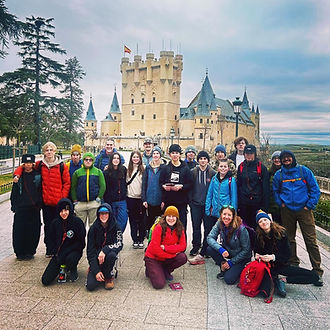
Field Study
Our year of academic study at Headwaters culminates in a Field Study. This hands-on, place-based educational program is the cornerstone of experiential education. The excursion is approximately one-week and traditionally takes place in the spring semester.
Students take part in local, regional, and overseas trips designed to provide an immersion learning experience. An academically-based program, students use their Field Study to research a specific topic in preparation for a public "presentation of learning" upon return.
Field Study excursions have previously included destinations to Ecuador and Mexico for 8th graders. Sixth and seventh grade students have studied Butte, Yellowstone National Park, and Grand Teton National Park.
8th grade - Iceland Field Study
We’re thrilled to share that our 8th grade Field Study for the 2025–2026 school year will take us to Iceland! With its breathtaking landscapes, rich cultural history, and focus on sustainability, Iceland is the perfect setting for hands-on learning. Students will explore geothermal energy, volcanic formations, and Icelandic culture, immersing themselves in experiences that spark curiosity and connect classroom learning to the world around them.


7th grade - Montana Outdoor Science Academy
Our weeklong visit to Montana Outdoor Science Academy challenges our 7th graders geographically, culturally and physically to push themselves out of their comfort zones. Montana Outdoor Science Academy supports our team with learner-centered practices implemented by teachers who are lifelong learners in content and craft. Their approach is place-based, connecting learning with community. They define place as the ecological, cultural and economic aspects of a community.
In our small groups, we will learn about group influence and decision making, power and conflict in groups, and participants will cultivate self-awareness regarding group participation. Students will use both leadership and observer roles to become astute observers of group dynamics and cultivate effective communication and participation strategies in a small group setting.
Academic emphasis: Montana Outdoor Science Academy programming is high-quality, place-based instruction. They teach to state and national science standards, including Next Generation Science Standards (NGSS). Based outside of Missoula, they believe great programs are student-centered, standards-based, safety-conscious and fun!
6th grade - Montana History
Montana history is a history of people and land. No matter how you try and look at it, it always comes back to people, and the land they lived on. From Sacagawea, Chief Joseph, and the Corps of Discovery who navigated the terrain, to the fur trappers, ranchers, and placer prospectors who harvested the abundance of the land, to the industrial miners who delved deep into the earth, the history of Montana is a history of landscape. Few things make travel more exciting than learning the stories of the land. Based out of Homestake Lodge, our 6th graders will explore Butte and Helena. Butte was the first major city in Montana. In the late 1800s, right around when Montana was becoming a state, Butte was created as a silver and gold mining camp. After the turn of the century, however, copper became the main output of the mines of Butte. Helena, similar to Butte, is best understood by understanding its history. Like many other towns in Montana, Helena started out as a mining town. Helena was founded seemingly by accident. The Four Georgians as they are affectionately called, had spent months prospecting the region in hopes of striking it rich and finding the next big claim. By the time they reached Helena, they decided that this would be it, they would give it “one last chance” before packing it up and returning home. Unlike the countless boom towns in the area, Helena has stood the test of time, largely as a result of the decision to make Helena the state capital.
Academic emphasis: western mining history; railroads; toxic mining waste and polluted water; Chinese workers; Montana legislature; the “Four Georgians”; Montana’s twelve tribal nations; Montana territory, and more.






